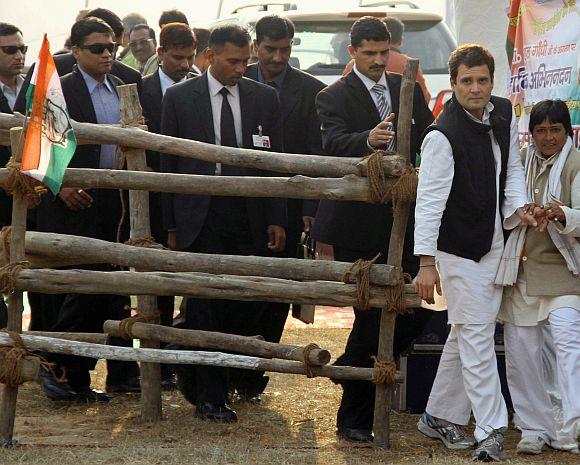
The 2012 assembly election in Uttar Pradesh will go down as one of the most regressive elections fought on caste identity, reports Sheela Bhatt.
In the towns and cities of Uttar Pradesh, you would not know that there is an election on. The contest for this politically key state is bereft of the proverbial hot button -- an issue that can grab people's attention across the state.
The vacuum created by the absence of the hot button has been filled by an intense caste war. Uttar Pradesh of 2012, observers say, resembles the badlands of Bihar before the Nitish Kumar era. Voters are determined to have their caste representative as their lawmaker.
Except in a handful of assembly seats where voters demand development, the buzz phrase in the state is 'social re-engineering of castes' to win votes.
Price rise, the high cost of living, hopeless governance, corruption, gender insensitivity, decaying infrastructure and the polluted environment of Uttar Pradesh's towns and cities are not what make for election planks here.
The appalling state of governance has led to small parties mushrooming and giving voice to specific communities and their issues.
This election is not about a better tomorrow for Uttar Pradesh's 180 million people.
All political parties, the media and many voters feed the monster of casteism. Candidates only speak about the composition of communities in their region. Reporters are left with no choice but to ask what combination of caste votes candidates are confident of.
Speak to voters and they have it figured out: If Mulayam Singh Yadav's Samajwadi Party comes to power it will be the rule of Yadavs and Muslims; if Mayawati's Bahujan Samaj Party retains power it will be dominated by her Dalit agenda; if the Bharatiya Janata Party is part of the government or lends it support from outside, the upper castes and a section of middle-class Hindus will feel elated.
The Samajwadi Party's vote bank of Yadavs and Muslims has inadequate presence in almost 150 seats in UP. The Dalits (the BSP's vote bank) and Brahmins (the BJP's vote bank) are more widely sprinkled, but even the BJP and BSP are concentrating on just about 250 seats.
Please ...
Check out Rediff Realtime News for the latest news on the UP election
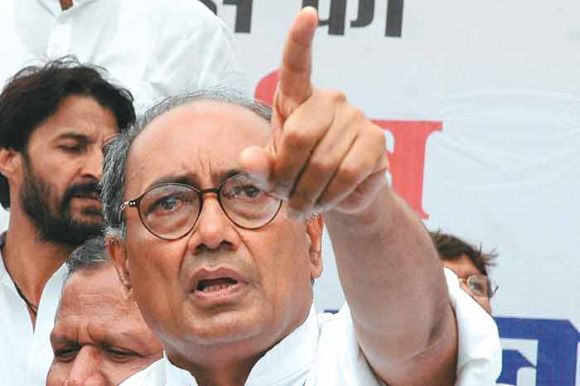
The Congress party and the BJP, the so-called national parties, are much to be blamed for highlighting identity-based politics. The BJP is smug that it has upper-caste Hindu votes in the bag.
"If the Congress party had just one Brahmin leader like before," a BJP strategist bragged to Rediff.com, "it could have galvanised the entire political scene because Dalits and Muslims are the Congress's natural allies!"
Told about it, a Union Cabinet minister and senior Congress party leader retorted: "Rahul Gandhi se bada koi Brahmin hai kya? (Is there a bigger Brahmin than Rahul Gandhi?)"
In the rank and file of Congress party workers in Uttar Pradesh, many blame Congress General Secretary Digvijay Singh -- the veritable mouthpiece for Rahul Gandhi, the Congress party's star campaigner -- for underplaying the importance of Brahmins and trying to give prominence to Muslims and Thakurs.
Singh has convinced Rahul Gandhi that to beat the regional parties on their turf the Congress party has no option but to surrender to caste politics. Singh has resurrected the perception of the Uttar Pradesh election being synonymous with the Muslims' vote preference.
Please ...
Check out Rediff Realtime News for the latest news on the UP election
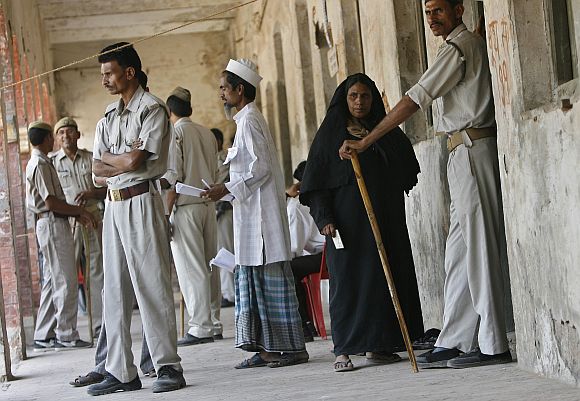
There seems to be a frenzy to woo the Muslims, who make up about 20 percent of the voters and who dominate about 120 out of the 403 assembly constituencies.
No one can ignore the Muslims. Not even the BJP, which is trying to divide Muslim voters. The BSP and Samajwadi Party have each given about 85 tickets to Muslim candidates. The Congress party has given 59 tickets to Muslim candidates.
The BJP's strategy is to prop up Muslim parties and candidates who can ensure that the winning candidates of rival parties do not get Muslim votes en masse.
Of its 403 nominees, the BJP has only one Muslim candidate -- Shafi Shakil Alam in Sahaswan constituency, Badaun district.
The BJP's argument: If Muslims don't vote for the party's candidate, why give them tickets to lose?
The BJP is not pushing any lofty ideology; what the Congress does to the Muslims, the BJP does for Brahmin votes. So the Congress party has to ensure that the Samajwadi Party should not get all the Muslim votes, the BJP should not get the Brahmin votes en masse and Mayawati should not get all the Dalit votes.
The rejection en masse of any caste/religious bloc hurts the Congress party most, because it does not have a monopoly over any one bloc. In this bizarre game of political chess, the Congress party's task is the most difficult.
The BJP is waiting in the wings to capitalise by default on the Samajwadi Party's, the Congress party's and the BSP's political mistakes.
For all its talk of building a Ram temple in Ayodhya, the BJP does not want a sharp polarisation of Hindu and Muslim votes. It just wants to spread a subtle message that the Congress party is back to its old habit of 'Muslim appeasement.'
Please ...
Check out Rediff Realtime News for the latest news on the UP election

Gujarat Chief Minister Narendra Modi may not campaign for the BJP in UP because he is sulking, but it is doubtful if he is really needed in UP.
Communal polarisation would help the Congress party more believe Samajwadi Party leaders. The Congress party -- as was evident in the Salman Rushdie affair -- has played its Muslim card openly.
The BJP is positioning itself to get Other Backward Classes votes -- those grumbling against the proposed 4.5 percent Muslim sub quota in reservation in government jobs and state-run education institutions in the 27 percent OBC quota.
With an eye on the OBC vote, the BJP inducted controversial BSP leader Babu Singh Kushwaha because he can get Kushwaha community votes. Ponty Chadha, the liquor baron and key Mayawati financier who came under the income-tax scanner last week, was close to Kushwaha.
And BJP President Nitin Gadkari would not have bragged about bringing in Uma Bharti as a star campaigner had Bharti not been a Lodh -- a so-called backward class.
The BJP wants the Congress party to take away enough Muslim votes in each constituency to defeat the Samajwadi Party's candidates. But the Muslim votes snatched away by the Congress party should not be enough for Congress candidates to win either.
Such is the weight of identity here in India's heartland that Rahul Gandhi brought into the UP battleground Sam Pitroda -- the Chicago resident and technocrat -- who said he is proud to be born in a carpenter's family.
Please ...
Check out Rediff Realtime News for the latest news on the UP election

A report by the watchdog Association of Democratic Reforms reveals that all parties compete in giving tickets to candidates with criminal backgrounds.
Akhilesh Yadav, the Samajwadi Party's star campaigner, is the prime accused in a case of assets disproportionate to one's income. Thanks to the Congress party going soft on Akhilesh, his wife Dimple and father Mulayam Singh Yadav have been not affected in the last five years.
In this war of micro battles, eastern UP is as different from western UP as France is from Germany. And most of the Congress and BJP leaders based in New Delhi seem to be groping the dark.
Without the kind of grip over vote banks that regional parties enjoy, the Congress and BJP are working at what is euphemistically called 'media management.'
Another unprecedented feature of this UP election is Rahul Gandhi's karenge ya marenge (do-or-die) posturing. Even his adversaries feel the Congress party's king-in-waiting has taken a huge risk. Whether it is a calculated gamble or foolishness is the election's most debated issue.
'If he succeeds, definitely that will be beneficial; but if he doesn't succeed, he has to work very hard for the future,' Nationalist Congress Party chief Sharad Pawar said.
'Whatever the Congress might say, the public and those responsible for analysing the elections will definitely pass the buck onto him (Rahul, in case the gamble backfires),' Pawar added.
So far, no credible analyst or media report can claim that Rahul Gandhi's aggressive and almost obsessed involvement with the UP election will help the Congress party win more than 70 to 80 seats at best.
Congress party workers in UP have got the message -- Indira Gandhi's grandson is working hard. But does the Congress's prince have a dedicated army? A youth Congress party leader from Haryana assigned to eastern UP reveals, "We saw that thousands of young people who had been registered in the Youth Congress have deserted the party or have joined the Samajwadi Party and the BSP."
Please ...
Check out Rediff Realtime News for the latest news on the UP election
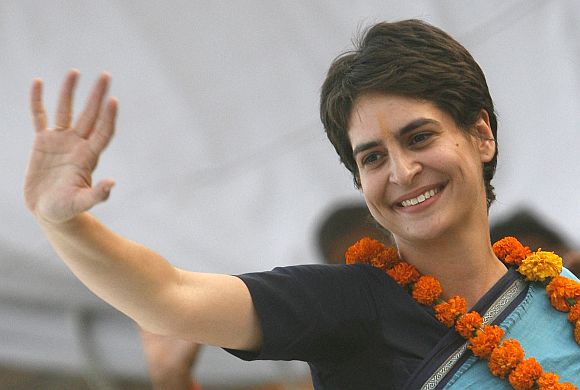
For all its couldn't-care-less posturing, the BJP is acutely aware of the Gandhi factor.
"If Priyanka Gandhi (Rahul's sister) steps out, Rahul's work can be taken to the next stage," admits a senior BJP leader.
"If the Congress party wins 80 seats, Rahul will be branded very successful. If he wins more than 100 seats he will be the unstoppable future of India," says a Union minister from South India.
The Gandhi scion is banking heavily on Kurmi leader and Union minister Beni Prasad Verma for victories in Kurmi-dominated areas. Dozens of Congress leaders including Digvijay Singh are working behind the scenes to ensure the Muslim vote.
Privately, the Congress party is giving hope to Muslims that the Presidential order of 1950 limiting reservation to Dalits among Hindus, Sikhs and Buddhists will be changed once the census figures based on religion are published. Muslim leaders want caste-based reservations for Muslims.
That has got the Samajwadi Party -- banking on Muslim votes to come back to power -- nervous. Hence, party supremo Mulayam Singh Yadav hugged New Delhi's Imam Syed Ahmed Bukhari and also nominated Bukhari's son-in-law Umar Ali Khan to contest the Behat, Saharanpur, assembly seat in UP on a party ticket.
Please ...
Check out Rediff Realtime News for the latest news on the UP election

The absence of a strong anti-incumbency wave against Mayawati's BSP has also made this election difficult to predict. Mayawati has given UP a revenue-surplus budget, rare in Indian states.
She has built thousands of miles of roads, has improved power generation capacity and has allotted 200,000 rooms to extremely poor Dalits.
She has handled the law and order situation better than the Samajwadi Party. On gender sensitivity, her record is far superior to the Samajwadi Party's.
The factors working against her are her eroding image -- due to corruption in her administration, cabinet and party -- and her reclusive style of governance.
Mayawati's core group believes the delimitation of constituencies in UP will be her trump card. She has meticulously worked out plans to woo voters according to new caste combinations created in each constituency.
She also has a more disciplined cadre than the BJP or the Congress party. But her biggest drawback is that in the last five years, ensconced in her posh fortress of a Lucknow office, she is far removed from her support base of the most neglected.
The chief minister is absolutely inaccessible to the common man. Even when she visited a village in the last five years, her officers would send in advance truckloads of water and sweepers to wash the roads and clean the gutters in the village.
But the charges of corruption against her make more news in Delhi than in the 6,000 'Ambedkar villages' in UP.
So you have a chief minister with a strong support base, a challenger with a strong support base, and India's ruling party's biggest political players diving headlong.
Please ...
Check out Rediff Realtime News for the latest news on the UP election
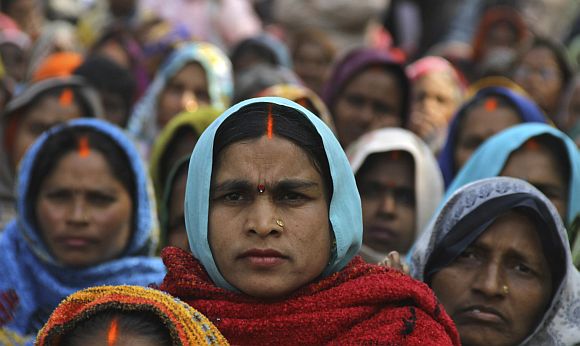
The voter too is keeping his options open. "Old farmers belonging to the Kurmi caste took us for a ride," rues Youth Congress leader Jayant Singh in Barabanki.
"When they came to knew we are from the Congress," he adds, "they told us Rahul's hard work will pay off, we may get 150 seats in UP. But when local Kurmi leaders went to them they said they will wait and watch till the day of voting. They said, 'Let us see what Mayawati wants to say'."
A BJP leader in New Delhi admits that the BJP, the Congress and the Samajwadi Party all agree that Mayawati cannot be taken lightly.
In the 2007 election, the Samajwadi Party won 97 seats. Party chief Mulayam Singh Yadav has been forced to repeat 80 percent of his elected legislators. Rival parties think these legislators will face the anti-incumbency factor.
The flip side of wooing Muslims and Yadavs is that upper-caste Hindus may stay away from the Samajwadi Party.
Meanwhile, the BJP is smiling by default because upper-caste Hindu voters have few options with the Congress party and the Samajwadi Party wooing openly the backward classes and minorities.
The only certain thing about the UP election is chaos. If the Congress is unable to win impressively, then it wants the Samajwadi Party to win and come asking for support. If the BJP is unable to win enough seats then it wants the BSP to win.
The Samajwadi Party will need to win on its own because if it does not, the Congress party will seek more than its pound of flesh.
This chaos theory is endorsed by BJP President Nitin Gadkari who -- eye firmly on the 2014 general election -- is busy telling reporters that the BJP will not form the government with the Samajwadi Party or the BSP in Lucknow.
What he won't say is that the BJP is keen to support a BSP government from outside and take West Bengal Chief Minister Mamata Banerjee and Tamil Nadu Chief Minister J Jayalalithaa's support to keep pressure on Manmohan Singh's government in New Delhi.
If Trinamool Congress leaders are to be believed, their party chief Banerjee has bought this theory too.
If Uttar Pradesh, the semi-final, is so convoluted, imagine what the final -- the general election in 2014 -- will be like.
...
Check out Rediff Realtime News for the latest news on the UP election